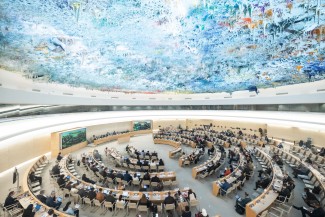WHA adopts Global Alcohol Action Plan

This article was first published in the GAPA Newsletter
On Friday 27 May, at the Palais des Nations in Geneva, the 75th World Health Assembly (WHA) adopted the Global Alcohol Action Plan, in the making for two years. GAPA welcomes the decision by the WHA. Now words must be followed by action, globally and in the member countries. For that, adequate resources are needed, particularly in low and middle-income countries to address global inequities.
In Friday’s WHA debate 24 Member States spoke in support of the Global Alcohol Action Plan. The United Arab Emirates spoke on behalf of the 21 countries in the Eastern Mediterranean region, Kenya on behalf of the 47 countries in the African region and France on behalf of 27 EU countries and several other European countries. Support for the action plan was mentioned by several country delegations in other parts of the debate. Hence, the plan was adopted with overwhelming support from Member States. At the end of the debate in the allocated slot for civil society organisations’ statements there where several strong statements.
WHO Director General, Dr Tedros, in his remarks following the adoption of the Non-Communicable Diseases suite of documents, including the alcohol action plan, reminded Member States that what happens in the meeting rooms at WHA is only important if Member States take it home and act on it there.
“Rampant and unrestricted advertising”
Chair of GAPA, Professor Sally Casswell commenting on the WHA decision said: “We are very happy to see the Global Alcohol Action Plan adopted and note strong support from Members States in all regions including from several low- and middle-Income Countries. Kenya speaking on behalf of the African block pointed out alcohol consumption is increasing driven by ‘rampant and unrestricting advertising on social media and interference by the alcohol industry to influence policy decisions’.” ”There is no time for complacency and implementation of the action plan must start without delay” said Professor Casswell who also underlined that GAPA wants to see regular reporting to the WHO governing bodies of the efforts and impact from – Member States and WHO in implementing the action plan. “If action under the auspices of the Global Action Plan is not sufficient to reduce alcohol-harm we will need to revisit a more binding international treaty as mentioned by several Member States in their contributions.”
While welcoming the adoption of the Global Alcohol Action Plan at WHA75, GAPA still calls for strengthening WHO support for Member States to manage interference in policy making by the alcohol industry and protecting the Best Buy alcohol policies and the WHO SAFER measures. Several Member States, including the European region, also addressed these concerns in their interventions requesting WHO to develop stand-alone guidance for member states on how to handle the conflict of interest of the alcohol industry in policy making.
GAPA further underlines the need to address cross border marketing of alcohol. Just before the WHA the WHO issued a technical report on this topic as requested by Member States. The report points out the dangers of alcohol marketing and that controlling cross border marketing requires substantial coordination and sustained attention at national, bilateral, and multilateral levels. GAPA urges WHO and Member States to initiate a process to develop international regulations of this kind of marketing.
Global advocacy
Civil society has been actively involved in the drafting of the Global Alcohol Action Plan, through online consultations and a special session of the 2021 WHO Forum on Alcohol Drug and Addictive Behaviour. Civil society has also been active in advocating for the action plan and for the best possible content. GAPA, its’ regional alliances and their national constituencies along with many other networks have contributed to the result.
The adoption of the WHO Global Alcohol Action Plan 2022-2030 is the result of three years of work. In 2019 the World Health Assembly requested the WHO Director-General to “to report to the Seventy-third World Health Assembly in 2020, through the Executive Board, on the implementation of WHO’s global strategy to reduce the harmful use of alcohol during the first decade since its endorsement, and the way forward”. The report was discussed at the WHO Executive Board in February 2020, and the Board, in its decision EB146 (14), called for accelerated action to reduce the harmful use of alcohol. The Board requested the WHO Director-General “to develop an action plan (2022-2030) to effectively implement the Global strategy to reduce the harmful use of alcohol as a public health priority, in consultation with Member States and relevant stakeholders.”
GAPA and its global network together with other civil society organisations have been actively participating throughout these three years.
See the stages and GAPA positions throughout this process here.
The action plan was adopted as presented to the WHO Executive Board in this document (EB150/7 Add.1): Draft action plan (2022–2030) to effectively implement the global strategy to reduce the harmful use of alcohol as a public health priority.